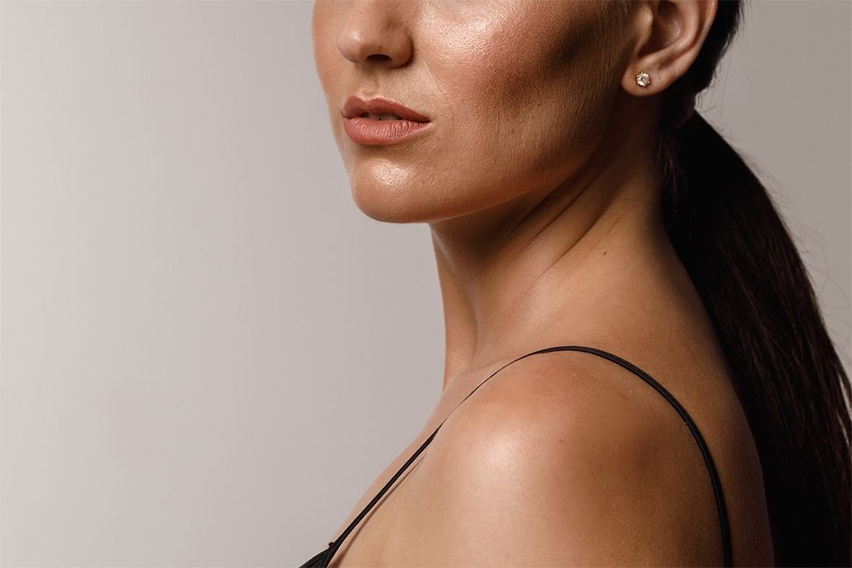
Dealing with oily skin can be frustrating. It can lead to acne breakouts, clogged pores, and a shiny complexion that can leave you feeling self-conscious. If you’re tired of dealing with oily skin, there are several things you can do to reduce your skin’s oil production. In this article, we’ll take a look at some tips on how to say goodbye to oily skin for good.
One of the most important steps to combat oily skin is to cleanse your face regularly. Use a gentle cleanser twice daily, morning and evening, to remove excess oil, dirt and impurities from your skin. Avoid using hot water as it can strip your skin of its natural oils, which can cause your skin to produce more oil.

A toner can help remove any remaining dirt and impurities on the skin after cleansing. Look for a toner that contains ingredients like salicylic acid or glycolic acid, which can help unclog pores and reduce oil production. After cleansing, apply the toner with a cotton ball or pad.
It may seem counterintuitive to moisturize oily skin, but it’s actually an important step in keeping your skin balanced. Use a lightweight, oil-free moisturizer to hydrate your skin without adding excess oil. Look for a moisturizer that contains ingredients like hyaluronic acid, which can help hydrate the skin without adding oil.
If you notice your skin getting oily while out and about, use blotting paper to quickly absorb the excess oil. Blotting papers are a great option for on-the-go touch-ups as they can help remove excess oil without damaging your makeup.
Heavy oil-based makeup can lead to oily skin. Instead, look for oil-free or water-based makeup products that won’t clog your pores or add excess oil to your skin. Mineral makeup can also be a good option for oily skin as it tends to look lighter and more natural.

Exfoliating can help remove dead skin cells and unclog pores, which can help reduce oil production. Use a gentle exfoliator once or twice a week to keep your skin smooth and clear. Avoid harsh scrubs or scrubs as these can irritate the skin and lead to more oil production.
What you eat can also affect your skin. Foods high in sugar, processed foods, and fried foods can all contribute to oily skin. Instead, focus on eating a healthy, balanced diet with lots of fruits, vegetables, and lean protein.
Clay masks can be very effective in reducing excessive oil production. Look for a mask that contains ingredients like kaolin or bentonite clay, which can help absorb excess oil and unclog pores. Use a clay mask once or twice a week to keep your skin balanced.
While it’s important to cleanse your skin regularly, it’s also important not to wash your face too often. Over-washing can strip your skin of its natural oils, which can actually lead to more oil production. Cleanse your face twice daily and avoid harsh or abrasive cleansers.
Drinking plenty of water can help keep skin hydrated and balanced. When your skin is dehydrated, it can actually produce more oil to compensate. Try to drink at least 8 glasses of water daily and avoid sugary or caffeinated drinks, which can dry out your skin.
Sun damage can actually lead to more oil production. Therefore, it is important to protect your skin with sunscreen. Look for a sunscreen that is oil-free and non-comedogenic, meaning it won’t clog your pores. Apply sunscreen daily, even on cloudy days or when staying indoors, as UV rays can penetrate through windows.

Stress can also contribute to oily skin because it can trigger the production of certain hormones that can increase oil production. Try to manage stress through activities such as exercise, yoga, meditation, or deep breathing. Getting enough sleep and good sleep hygiene can also help reduce stress and promote healthy skin.
If you’ve tried these tips and are still struggling with oily skin, it may be time to seek professional help. A dermatologist can help you diagnose underlying skin conditions that may be contributing to your oily skin and recommend targeted treatments or medications. They can also recommend specific skin care products tailored to your skin type and concerns.
Using a gentle cleanser is one of the most important steps in treating oily skin. Look for a cleanser designed for oily or acne-prone skin, and avoid harsh or abrasive ingredients like alcohol, fragrance, or sulfates. Cleansing twice daily, morning and evening, can help remove excess oil and prevent buildup in your pores.
Although it may seem counterintuitive, using a moisturizer can actually help control oily skin. When your skin is dehydrated, it can actually produce more oil to compensate. Look for a lightweight moisturizer that is oil-free and non-comedogenic, meaning it won’t clog your pores. Apply moisturizer after toner or serum and before sunscreen.
Blotting papers can be a quick and easy way to remove excess oil from your skin throughout the day. Look for blotting papers made from natural ingredients like rice or charcoal that can help absorb oil without stripping your skin of its natural moisture. Gently pat on areas that tend to get oily, such as the forehead, nose and chin.
In summary, dealing with oily skin can be challenging, but not impossible. By following these tips, you can help reduce oil production and keep your skin balanced and healthy. Remember to use gentle cleansers, toners and moisturizers, avoid heavy makeup, exfoliate regularly, watch your diet, use a clay mask, avoid overwashing your face, stay hydrated , using sunscreen, managing stress, and seeking professional help when needed. With a little effort and patience, you can say goodbye to oily skin forever.